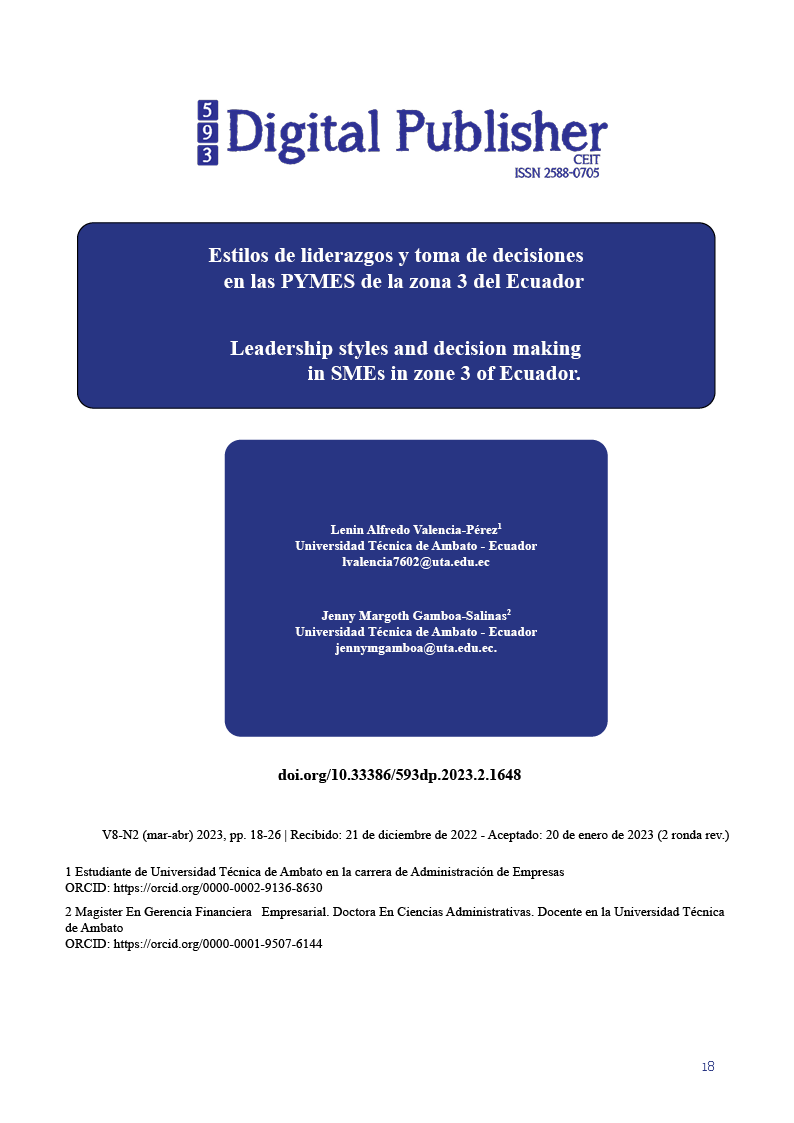Leadership styles and decision making in SMEs in zone 3 of Ecuador.
Main Article Content
Abstract
The leadership style and decision-making within companies have changed in recent years due to the pandemic caused by the coronavirus, which caused several effects on Ecuadorian industries despite being large, medium-sized or small companies. The acceptance of new leadership measures is essential in order to make adequate decisions and at the same time carry out strategies to activate the economy of the goods and services companies that are within zone 3 of Ecuador. Objective: Analyze how leadership styles influence decision making in SMEs in zone 3 of Ecuador. Methodology: It is important to recognize that this type of research will be developed using the descriptive methodology of the information, on the other hand, the adoption of bibliographic research methods, in such a way that it can deepen the relation of the theoretical framework. In this way, the sample composed of 384 companies from a population of 243651 institutions was obtained, in this way contact via email with the active members in the organization was implemented, in this way the data that provides authenticity by the known coefficient will be obtained. as Chi Square. Result: Therefore, 50% of the managers of the SMEs in zone 3 of Ecuador, assure that the training sessions are very essential and convenient to obtain a better performance in the company, in such a way that there is a 70% of the companies that do not know the operation of the metadata that helps us to provide information about the data produced such as quality, history, describe the content and different characteristics of the data within certain activities of the company. Conclusion: To close the idea, a good leader has the talent to motivate collaborators and generate an adequate organizational climate for efficient performance and make the most of the talent of collaborators in the company organization.
Downloads
Article Details

This work is licensed under a Creative Commons Attribution-NonCommercial-ShareAlike 4.0 International License.
1. Derechos de autor
Las obras que se publican en 593 Digital Publisher CEIT están sujetas a los siguientes términos:
1.1. 593 Digital Publisher CEIT, conserva los derechos patrimoniales (copyright) de las obras publicadas, favorece y permite la reutilización de las mismas bajo la licencia Licencia Creative Commons 4.0 de Reconocimiento-NoComercial-CompartirIgual 4.0, por lo cual se pueden copiar, usar, difundir, transmitir y exponer públicamente, siempre que:
1.1.a. Se cite la autoría y fuente original de su publicación (revista, editorial, URL).
1.1.b. No se usen para fines comerciales u onerosos.
1.1.c. Se mencione la existencia y especificaciones de esta licencia de uso.
References
Abreu, J. (12 de 2017). El Método de la Investigación. Obtenido de http://www.spentamexico.org/v9-n3/A17.9(3)195-204.pdf
Abundis Espinosa, V. (2017). Beneficios de las encuestas electrónicas como apoyo para la investigación. Obtenido de Dialnet: https://dialnet.unirioja.es/servlet/articulo?codigo=7286080
Acuña, I. (16 de 03 de 2017). Evaluación de validez convergente y discriminante en tests computarizados de toma de decisiones. Obtenido de ARTIGO: http://dx.doi.org/10.15689/ap.2017.1603.12952
Aguirre Sajami, C. (14 de 12 de 2020). La rentabilidad como herramienta para la toma de decisiones: análisis empírico en una empresa industrial. Obtenido de VALOR CONTABLE : https://revistas.upeu.edu.pe/index.php/ri_vc/article/view/1396
Alcantara , J. (2017). UNIVERSIDAD NACIONAL DANIEL ALCIDES CARRIÓN. Obtenido de http://repositorio.undac.edu.pe/bitstream/undac/785/1/COLQUI%20CORONEL.pdf
Añazco Camacho, K. (5 de 10 de 2018). Los estilos de liderazgo y su efecto en la satisfacción laboral. Obtenido de INNOVA: http://201.159.222.115/index.php/innova/article/view/908
Ávila Foesther, H. (2018). LIDERAZGO TRANSFORMACIONAL Y GESTIÓN MUNICIPAL; MUNICIPALIDAD PROVINCIAL DE HUARAZ. Obtenido de Revista Gobierno y Gestión Pública: https://www.aulavirtualusmp.pe/ojs/index.php/RevistaGobiernoyG/article/view/2382
Betancourt, R. (2018). Liderazgo democrático versus personalismo en tiempos de celebraciones. En F. Langue. París: Mascipo-CNRS. Obtenido de PERFILES SEMBLANZAS.
Candelo V., J. (24 de 03 de 2022). Efecto de la incertidumbre en las organizaciones del mercado accionario: una herramienta para la toma de decisiones y la inteligencia organizacional. Obtenido de SCIELO Print version ISSN 0123-5923: https://doi.org/10.18046/j.estger.2022.162.4689
Cárdenas , S. (14 de 12 de 2020). La rentabilidad como herramienta para la toma de decisiones: análisis empírico en una empresa industrial. Obtenido de Valor Contable : https://revistas.upeu.edu.pe/index.php/ri_vc/article/view/1396
Castañeda, R. (04 de 2022). Liderazgo y autoridad en la resolución de problemas complejos: hacia un método de gestión. Obtenido de SCIELO versión On-line ISSN 0718-0764: http://dx.doi.org/10.4067/S0718-07642022000200321
Chacón-Henao, J. L.-Z.-P. (24 de 03 de 2022). Liderazgo compartido en equipos directivos y desempeño organizacional. Obtenido de Estudios Gerenciales : https://doi.org/10.18046/j.estger.2022.162.4524
Colina, J. (2017). Influencia del liderazgo autocrático y el liderazgo democrático en el clima laboral en las empresas colombianas del sector público. Obtenido de http://hdl.handle.net/10654/16280.
Cotán, A. (2020). El método etnográfico como construcción de conocimiento: un análisis descriptivo sobre su uso y conceptualización en ciencias sociales. Obtenido de http://dx.doi.org/10.24310/mgnmar.v1i1.7241
Delgado, C. M. (2021). Estilo de comportamiento conductual de los líderes de la Cooperativa Calceta Ltda. Plan de mejoramiento. Obtenido de Polo del Conocimiento ISSN: 2550 - 682X: DOI: 10.23857/pc.v6i7.2872
Fernández, P. (11 de 10 de 2019). Qué es el coaching de liderazgo. Obtenido de GROWLIA: https://growlia.com/que-es-el-coaching-de-liderazgo/
Goleman, D. (12 de 5 de 2017). Qué hace a un líder. Obtenido de ACADEMIA Accelerat ing t he world's research: https://d1wqtxts1xzle7.cloudfront.net/56851155/QUE_HACE_UN_LIDER-with-cover-page-v2.pdf?Expires=1665875927&Signature=LF70eJPeq2Xikb7SIFR6Lz~G7FpkDcAdGxovNDyebmKQ5jwZOxu6OcDt8Q8JQNG3O0pD-bYjT5zyKzKnVMXNOu~NKV7vv00GgsYyCp8tPV8TDRNkVMU7bU-vLgu4E0J53~kbaGJxT9
Guerrero Bejarano, M. (5 de 10 de 2018). Los estilos de liderazgo y su efecto en la satisfacción laboral. Obtenido de http://201.159.222.115/index.php/innova/article/view/908
Guzmán, J. (2019). Técnicas de Investigación de Campo. Obtenido de Unidades de Apoyo para el Aprendizaje: https://uapa.cuaieed.unam.mx/sites/default/files/minisite/static/0fecd888-6a3f-4b31-b704-a2d94e3eed72/U000308176506/index.html
Hernández , R. (21 de 4 de 2017). ¿Chi cuadrado o Ji cuadrado? Obtenido de https://www.medigraphic.com/pdfs/medicentro/cmc-2017/cmc174a.pdf
INEC. (2021). Obtenido de Censo Ecuador : https://www.ecuadorencifras.gob.ec/estadisticas/
Investigación de campo. (25 de 10 de 2022). Obtenido de https://www.significados.com/investigacion-de-campo/
Jose , P. (22 de 1 de 2018). El poder de la inteligencia emocional. Obtenido de Coaching Ejecutivo : https://estilosdeliderazgo.org/estilos-de-liderazgo/estilos-de-liderazgo-segun-goleman/liderazgo-visionario/
Journal, R. (2017). El liderazgo Democrático. Obtenido de INNOVA Vol 2, No. 4, 155-162: file:///C:/Users/jival/Downloads/Dialnet-ElLiderazgoDemocratico-5922017.pdf
Mancheno-Saá, M. J.-B. (2017). Consideraciones sobre el Marketing Ético. Obtenido de Revista Publicando: https://core.ac.uk/download/pdf/236644911.pdf
Monrroy Rodríguez, N. (2017). Test Estadísticos de Chi-Cuadrado. Obtenido de KONRAD LORENZ: https://repositorio.konradlorenz.edu.co/handle/001/3902
Robbins, S., & Timothy, J. (27 de 05 de 2020). Making management decisions in construction SMEs of the special tourist and cultural district of Riohacha. Obtenido de Revista Espacios ISSN: 0798-1015: https://www.revistaespacios.com/a20v41n21/a20v41n21p25.pdf
Saá, M. J. (2017). Consideraciones sobre el Marketing Ético. Obtenido de Revista Publicando, 3(9), 509-519.: https://core.ac.uk/download/pdf/236644911.pdf
Vargas, G. (24 de 12 de 2021). Relación entre los estilos de liderazgo y el compromiso organizacional en medianas y grandes empresas. Obtenido de RENATI: https://renati.sunedu.gob.pe/handle/sunedu/3107876
Veizaga Mamani, C. (06 de 05 de 2022). Diseño de un plan integral para el fortalecimiento del liderazgo estratégico a fin de lograr un manejo eficiente del personal de la empresa. Obtenido de UMSS: http://ddigital.umss.edu.bo:8080/jspui/handle/123456789/29850



